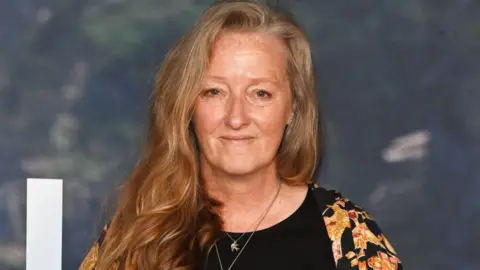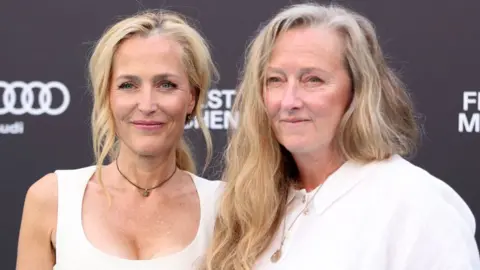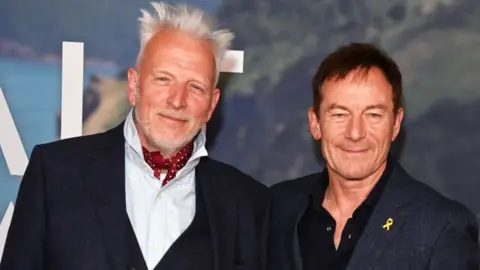The Salt Path author defends herself against claims she misled readers
 Getty Images
Getty ImagesAuthor Raynor Winn has been accused of fabricating or giving misleading information about some elements of her best-selling book The Salt Path.
The 2018 book, and recent film adaptation, told the story of a couple who decide to walk the 630-mile South West Coast Path after their home is repossessed.
An investigation by the Observer suggested some of Winn's claims about her husband's illness and the events that led to the couple losing their home have been misrepresented.
Winn has described the Observer article as "highly misleading" and said the couple are taking legal advice, adding that the book was "the true story of our journey".
Here's what we know so far:
What is The Salt Path about?
 Getty Images
Getty ImagesThe Salt Path has sold more than two million copies since its publication in March 2018, and a film adaptation starring Gillian Anderson and Jason Isaacs was released earlier this year.
In the book, Winn said she and her husband Moth lost a substantial sum of money after making a bad investment in a friend's business, which left them liable for his debts when the company failed. She said it ultimately led to the couple losing their home.
Around the same time, Winn wrote, Moth was diagnosed with corticobasal degeneration (CBD), which usually has a life expectancy of around six to eight years.
Winn said after she and Moth became homeless and Moth was diagnosed, the couple decided to set off on the South West Coast Path.
The book documents the pair eventually walking the full 630-mile route, living off a small amount of money in weekly tax credits each week, and wild camping every night.
It describes the physical exhaustion but also rewarding nature of the walk, as well as their interactions with members of the public along the way.
The book ends with the couple getting a fresh start with the offer of new accommodation. As a result of the walk, Winn says her husband's health improved, and he has now lived for 12 years since the diagnosis.
Winn has written two further books since The Salt Path - both of which also focus on themes of walking, nature, homelessness and wild camping - and has a fourth due to be published later this year.
What does the Observer's investigation allege?
 Getty Images
Getty ImagesThe investigation claims the couple lost their home in North Wales after Winn defrauded her employer of £64,000, and not in a bad business deal as she originally suggested.
The couple reportedly borrowed £100,000 with 18% interest, secured against their house, from a distant relative, in order to repay the money she had been accused of stealing.
The Observer said the couple also had a £230,000 mortgage on the same property, meaning that their combined debts exceeded the value of the house.
The couple's home was then reportedly repossessed after they were sued to recover the money.
The Observer added the couple owned a house in France that had land on which they had previously stayed. However, it also said the property had been in an uninhabitable state for some time, and that villagers said the couple never stayed in the house but would stay in caravans on the land.
The newspaper also said it had spoken to medical experts who said it was unlikely Moth had CBD, given his long survival after diagnosis.
It also reports that Raynor and Moth Winn are not the couple's real names.
After the Observer's article was published, the charity PSPA, which supports people with CBD and has worked with Raynor and Moth Winn, said "too many questions currently remain unanswered" and that it had "made the decision to terminate our relationship with the family".
How has Raynor Winn responded?
In a statement released later on Sunday, Winn said: "Today's Observer article is highly misleading.
"We are taking legal advice and won't be making any further comment at this time."
The statement continued: "The Salt Path lays bare the physical and spiritual journey Moth and I shared, an experience that transformed us completely and altered the course of our lives.
"This is the true story of our journey."
The BBC has also contacted Penguin, who published the book, for comment, as well as literary agents Graham Maw Christie.
The production companies behind the movie adaptation, Number 9, and the film's stars Anderson and Isaacs, have also been contacted for comment. BBC Film, which also helped finance and co-produce the movie, declined to comment.
